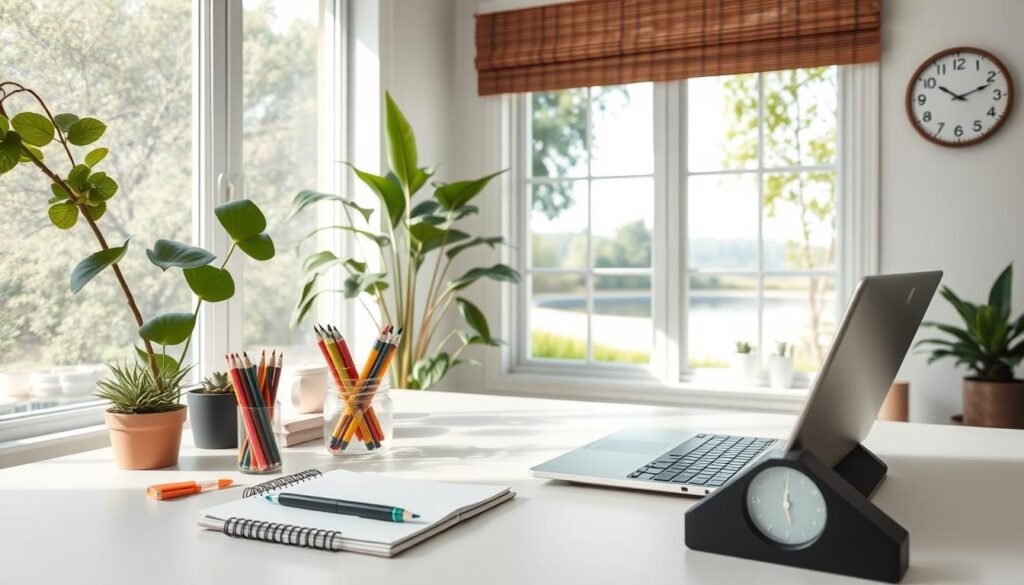Anxiety disorders are very common in the U.S., touching over 44 million adults every year. That’s a big chunk, more than 18 percent, of people across the country. For those facing anxiety, looking for a job can feel overwhelming. They need to find roles where their mental health is taken into account. Also, it’s key they land in a workplace where they feel supported, which can really help their well-being.
In this guide, we’ll look into jobs that don’t stress you out much, can be done from home, and are in companies that understand anxiety. Knowing the hurdles that anxiety brings can lead to enjoying your job more and doing better at it. A lot of folks are looking for jobs where things are orderly, quiet, and with some wiggle room—qualities important for feeling good and efficient at work.
We will talk about what makes a job good for those managing anxiety and share different job ideas that fit. Besides, we’ll cover how being part of a supportive group can boost your mental health and help you do well in your career. If you’re curious about finding folks who get what you’re going through with anxiety, here’s a good place to check on finding community support.
Key Takeaways
- Anxiety disorders affect over 44 million U.S. adults annually.
- Finding low-stress jobs is essential for managing anxiety.
- Structured and flexible work environments are ideal for individuals with anxiety.
- Remote jobs can provide the necessary comfort for those with anxiety disorders.
- Community support plays a crucial role in mental health and job success.
Understanding Anxiety and Its Impact on Employment
Almost 20% of adults each year face anxiety, leading to significant employment challenges. Anxiety comes in various forms such as generalized anxiety, panic disorders, and social anxiety. These can affect concentration, ability to meet deadlines, and stress management in the workplace. This impacts one’s mental health and productivity.
Anxiety and depression have spiked by 25% recently, driven by economic pressures. A survey found that 81% of job seekers want workplaces that support mental health. This shows a shift towards valuing supportive environments for those with anxiety disorders.
Anxiety can also have physical effects like headaches, muscle tension, and fatigue. These physical signs can cause more absences and lower work output. Social anxiety might make some avoid interaction, which can affect their progress and team work.
Anxiety challenges one’s thinking too. It might make making decisions harder, leading to indecision. Symptoms like a racing heart or sweating can affect one’s work and health over time.
Thanks to the Americans with Disabilities Act of 1990, workers with anxiety disorders have protection. This law helps ensure workplaces understand and support employees with anxiety disorders.
By tackling these issues proactively, people can better manage their anxiety. Strategies include arranging tasks, making deadlines clear, and speaking openly with bosses. Encouraging professional help for anxiety is key for better mental health and job success.
Why Finding the Right Job Matters for People with Anxiety
Finding a good job is crucial for people with anxiety. About 40 million adults in the U.S. have anxiety disorders. A bad job match can make stress worse. It’s key to have a job that makes you feel good and matches your strengths.
Having kind bosses and a supportive work atmosphere helps a lot. It makes employees with anxiety feel appreciated. For example, working from home reduces stress. Jobs like accounting pay well, offering financial security and less anxiety.
Jobs like veterinary assistants and graphic designers are also great. They offer creative ways to work and keep stress low. They pay around $30,000 and $53,000 a year. Other jobs, like warehouse work or janitorial positions, are good for those who like working alone. They provide a steady routine.
| Job Title | Average Annual Salary | Suitability for Individuals with Anxiety |
|---|---|---|
| Accountant | $74,000 | High earning potential, structured tasks |
| Veterinary Assistant | $30,000 | Calm environment, animal care focus |
| Graphic Designer | $53,000 | Creative role, distraction from stress |
| Warehouse Worker | $30,000 | Minimal interactions, routine tasks |
| Janitor | $29,000 | Independent work, routine-driven tasks |
Choosing a job that fits your interests can make you happier. It helps people with anxiety do well in their jobs. This leads to a better balance between work and life.
What to Look for in a Job if You Live with Anxiety
When looking for a job with anxiety, focus on certain things. Jobs with clear rules and goals can help. This makes the workplace less stressful for people with anxiety.
Jobs that let you choose your hours or work from home are also key. For example, computer programmers often work from home. This can help people with anxiety by reducing face-to-face contact.
It’s important to learn about a company’s culture before accepting a job. Find out if they support mental health. Companies that understand and support anxiety issues are better for your mental health.
The following table highlights key considerations when evaluating job opportunities:
| Factor | Description | Examples |
|---|---|---|
| Structured Environment | Defined roles with clear duties | Librarians, Graphic Designers |
| Flexibility in Jobs | Options for remote work and adjustable hours | Computer Programmers, Online Instructors |
| Supportive Company Culture | Workplaces that encourage open discussions about mental health | Massage Therapy Centers, Fitness Studios |
For tips on finding low-stress jobs, check out job search tips for anxiety. These tips can help you find a job that fits your skills and supports your well-being.
Good Jobs for People with Anxiety: Key Characteristics
Choosing the right career is vital for people with anxiety. Jobs that ensure a low-stress setting make work life better. These traits are key to feeling good and doing well at work.
Jobs suited for those with anxiety often have:
- Minimal social interaction – Less talking daily helps ease stress for many.
- Predictable routines – Knowing what each day brings adds comfort and peace.
- Structured tasks – Clear rules help focus without the stress of guessing.
- Calm and supportive atmospheres – Positive environments boost productivity and happiness.
- Opportunities for personal growth – Growing skills increases job love.
Stress-free jobs let people work independently at their own speed. Working alone helps avoid stress from team tasks or big responsibilities.
Top Low-Stress Jobs for People with Anxiety
Exploring low-stress job opportunities benefits those with anxiety. These roles focus on mental well-being. They also offer the bonus of less pressure. Here are the best jobs for people with anxiety. They make the work environment easier to manage.
Data Entry Specialist
A data entry specialist works in a structured setting. The job is about organizing and managing data on your own. It’s appealing because it’s low in stress. Employees often enjoy flexible hours. This suits those who prefer less pressure and more independence.
Delivery Driver
Becoming a delivery driver is a good choice for a stress-free job. You manage your schedules and routes. This independence brings a sense of freedom. For those with anxiety, driving and working alone has a calming effect. It’s why this job is a top pick for them.
Graphic Designer
Graphic designers work from anywhere, tapping into creativity. This job lets you express yourself with minimal social interactions. It’s good for reducing stress. You can set up a work space that makes you comfortable. It’s an ideal job for creating a stress-free environment.
Librarian
Librarians work in peaceful settings, surrounded by resources. They handle organizational tasks. This creates a calm atmosphere that’s good for those with anxiety. With routines and few interruptions, it’s one of the best jobs for them.
Freelance Opportunities for Individuals with Anxiety
Freelancing helps people with anxiety control their work life. It lets them choose where and when they work, which cuts down stress. Jobs that you can do from anywhere at any time offer remote work flexibility. This helps you manage how much you work, depending on what you’re comfortable with.
Benefits of Remote Work and Flexible Schedules
Traditional office jobs can be tough for those with anxiety. They often lead to more stress which can hurt mental health. By freelancing, people can work in places they feel relaxed, like their homes. Fields such as writing, graphic design, and digital marketing are great for anxiety-friendly freelancing. They let you express yourself without the need for many face-to-face meetings.

Tech and healthcare jobs offer predictable environments, good for mental health stability. Jobs like computer programming and counseling work well. Below is a list of top freelance jobs for people handling anxiety:
| Freelance Job | Field | Benefits |
|---|---|---|
| Freelance Writer | Creative | High control over deadlines and work environment |
| Graphic Designer | Creative | Opportunity for self-expression with minimal interaction |
| Software Developer | Technology | Structured tasks that can be completed remotely |
| Virtual Assistant | Administrative | Flexible tasks with adjustable workloads |
Virtual assistant jobs are growing, ideal for those who like staying home. Freelancing offers many chances, helping you care for your mental health while advancing your career. Checking out freelance job platforms can help find the right job for those with anxiety. It’s a good way to grow professionally and stay healthy. For tips on finding the right job, visit this helpful guide.
How to Create an Anxiety-Friendly Workplace
Creating an anxiety-friendly workplace requires various strategies. These help create a supportive environment. Employers are key in making sure employees feel safe and understood.
Structure and clear expectations are important. They reduce stress and help employees be productive.
Wellness programs are a great way to support employees. They can take mental health days to focus on well-being. Quiet spaces in the office are helpful too. They offer a place for employees to find peace during the day.
It’s vital to offer tools and strategies to handle stress. Here are some suggestions:
- Time management training to help employees prioritize tasks
- Structured routines that provide predictability
- Employee support programs that offer counseling and resources
Promoting open communication helps build a community. When coworkers support each other, it can lessen anxiety. Encouraging team activities in small groups is less daunting for some. This can improve morale.
Knowing what makes a workplace anxiety-friendly can lead to better jobs. It helps professionals find roles that fit their needs.
Skills That Are Beneficial for Anxiety-Friendly Careers
In today’s job world, it’s key to have the right transferrable skills for anxiety-friendly jobs. This is especially true for those dealing with anxiety. Skills like time management and organization are vital. They help you set up your day to lower stress. Being good at solving problems on your own also helps. It means you can face challenges without needing lots of help or dealing with too many people.
Anxiety management skills are really important too. They let you keep calm under pressure. This is something bosses really look for. Skills like being able to think critically and pay attention to small details are also valued. They’re especially important in jobs where you have to be precise, like writing technically or entering data. These skills don’t just help you do well; they also make you feel good about your work.
Many jobs are great for people with these skills. For example, technical writers work a lot on their own. And jobs in data entry or research mean you can focus more on tasks and less on socializing. Roles like court reporting or transcription need a lot of focus and attention to detail. This makes them great for those who are good at these things.

As workplaces change, there’s a growing need for skills that help employee wellness. Knowing that a lot of people feel stressed makes anxiety management skills even more valuable. If you work on these skills, you can have a rewarding career in a supportive place. This helps you do your best.
Finding Jobs with Minimal Social Interaction
Many people with social anxiety prefer jobs with minimal social interaction. This helps them feel more at ease at work. In the U.S., about 15 million adults experience social anxiety. It’s important to find jobs that meet their preferences. These jobs often involve working alone rather than in teams. This setup is great for those who like working by themselves.
Some good job options include:
- Data Entry Specialist
- Graphic Designer
- Accountant
- Researcher
- Writer/Content Creator
Data entry and researcher positions don’t need much talking to others. This lets people focus on their work without interruptions. Graphic Designers and Accountants usually need two years of schooling. Librarian and archivist jobs might need 2 to 7 years of study. Online teaching jobs are good too, especially if you’re still studying. These jobs often allow you to work from home, making it easier to manage social anxiety.
Transcription jobs are also worth considering. They require good grammar and the ability to focus, with little talking to others. To find these jobs, look at online job boards. Pay special attention to remote jobs and tasks you can do alone.
Building a support system, having clear boundaries, and looking after your well-being are key. Federal laws protect you if you have mental health issues. They ensure you’re treated fairly at work. Knowing your rights can help you feel more secure in your career choices, even with social anxiety.
For more tips on finding the right job, check out this resource.
Jobs Ideal for Self-Paced Work Environments
Self-paced jobs help make workplaces better for people with anxiety. Employees can set their own work speed. This lessens stress and helps them feel in control.
For example, roles like graphic design, freelance writing, or lab work are great. They let people handle their workloads better. Being able to decide when and how to do tasks can really help reduce pressure from tight deadlines.

Companies gain a lot by supporting self-paced work. Flexible schedules and focusing on results, not hours, create a healthier mental space. It lets people work at their own pace but still reach their goals. So, self-paced jobs boost not just wellbeing but also productivity and job happiness.
A lot of workers fight anxiety at work. Seventy-one percent of women and fifty-four percent of men say they feel work-related anxiety. Problems include social phobia and panic. Promoting self-paced jobs helps people handle their jobs better. This leads to better mental health and more job satisfaction.
Conclusion
Individuals with anxiety can find jobs that match their strengths. They can work in environments that support their mental health. Key factors include clear roles, set schedules, and understanding bosses.
Jobs like librarian, animal caretaker, and graphic designer are great. They offer a chance to excel without high stress. These jobs improve mental health, ease anxiety, and increase job happiness.
Working remotely or as a freelancer can help too. It lets people shape their work setting. This helps manage anxiety and keeps work-life balance.
It’s important to balance personal well-being with career goals. Exploring flexible careers and focusing on self-care helps. This way, people with anxiety can do well in their jobs and enjoy life.